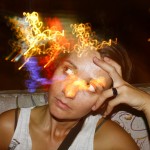
It’s well documented that people with severe mental health conditions such as schizophrenia, suffer from stigmatisation on a regular basis. Stigma can be caused by ignorance or a lack of knowledge about a disease. As the actress Shirley Maclaine once said:
Fear makes strangers of people who would be friends.
Researchers have developed a number of methods to try and increase empathy and understanding about schizophrenia in the wider population. One technique is to simulate the auditory and visual hallucinations sometimes experienced by people with schizophrenia, so that everyone can get an ‘insider’s perspective’ on the condition.
A team of researchers have now conducted a systematic review of quantitative and qualitative studies that explore the impact that these simulated hallucinations have on people. They searched a wide range of sources and found 10 studies to include in the review. A narrative synthesis of quantitative studies was conducted, and qualitative studies were synthesised using meta-ethnography.
Participants in the trials reported physical, cognitive and emotional discomfort. Simulated hallucinations sometimes produced concurrent negative affect, and physical and emotional distress, but were considered a highly acceptable learning tool.
The reviewers conclude:
Simulated hallucinations have contradictory effects on stigma, increasing empathy but also the desire for social distance. They should therefore be used with caution. Further research is required to discover if there is a way of using simulated hallucination interventions that increases empathy without increasing the desire for social distance from people with mental illness.
Ando S, Clement S, Barley EA, Thornicroft G. The simulation of hallucinations to reduce the stigma of schizophrenia: A systematic review. Schizophr Res. 2011 Oct 16. [Epub ahead of print] [PubMed abstract]

This is an interesting study, would like to know what methods they used to simulate hallucinations – is that information available?